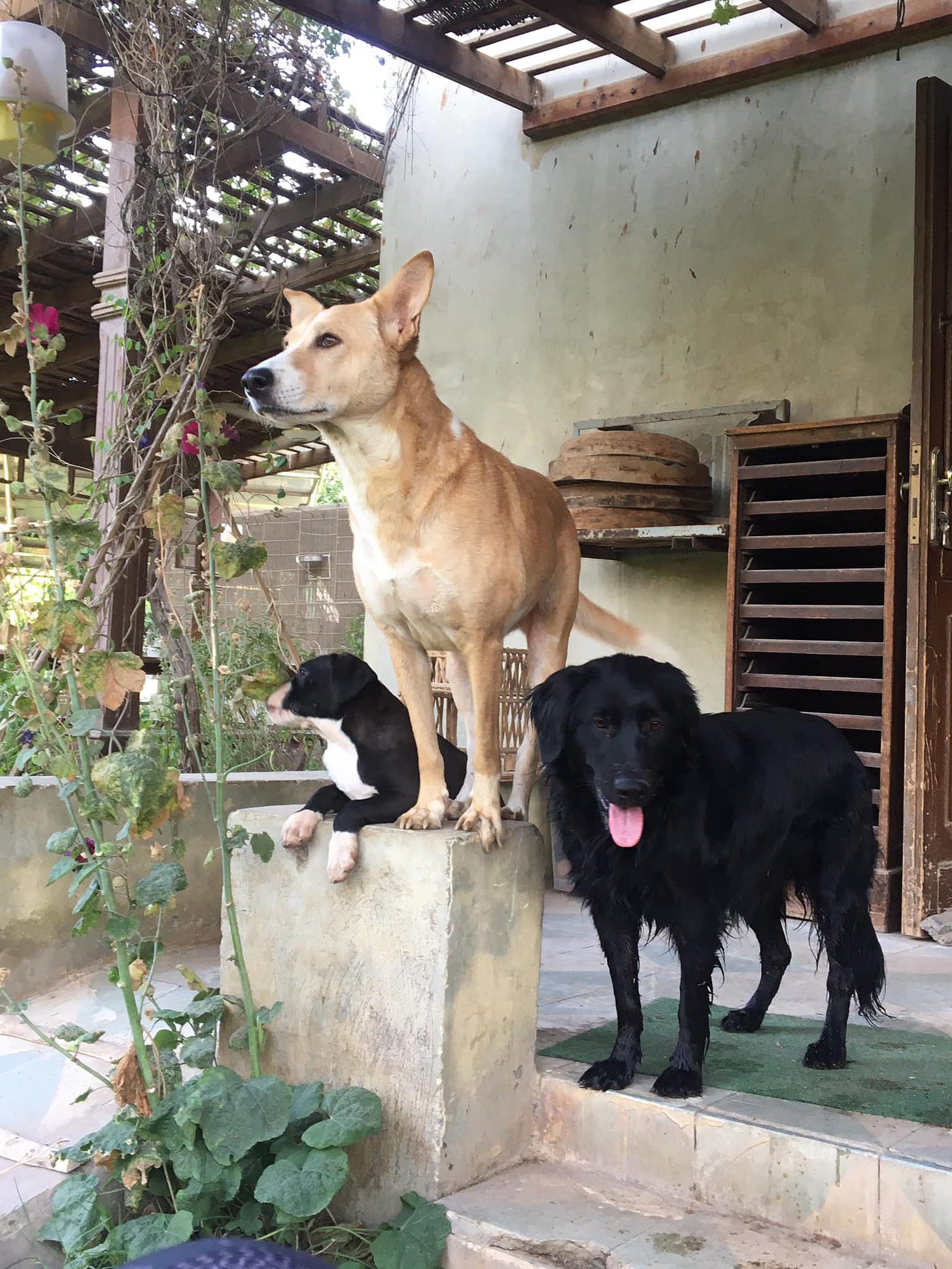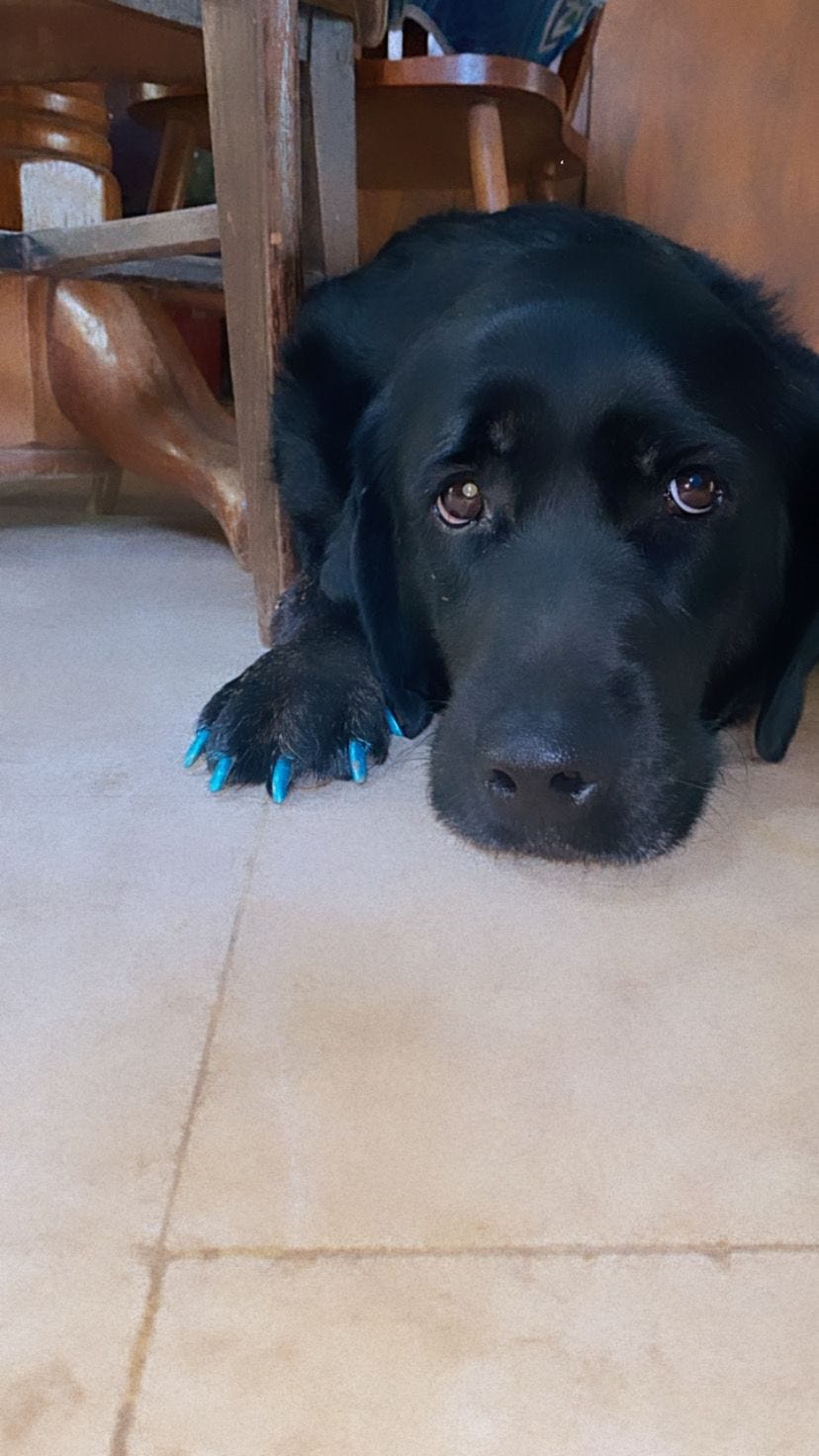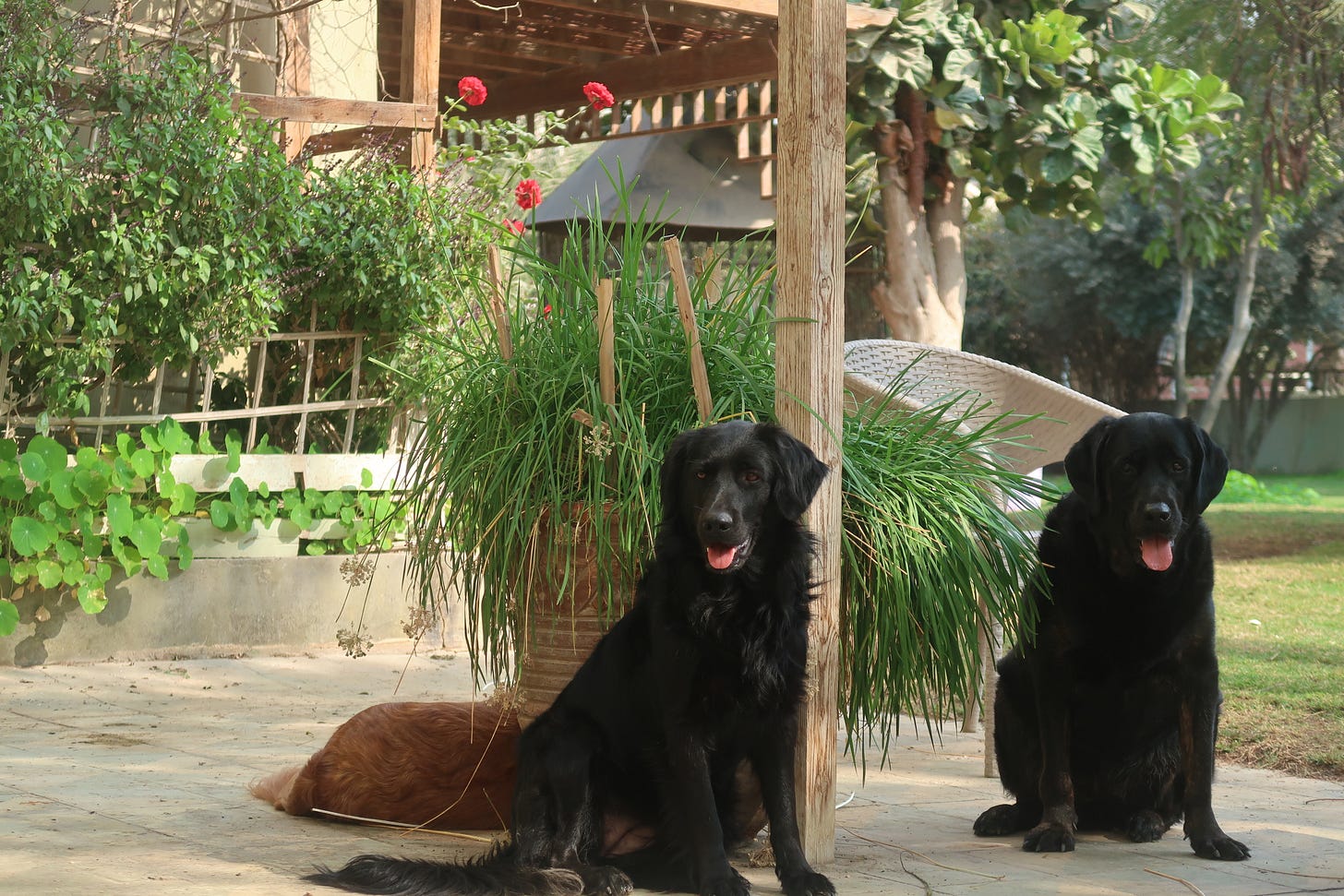I could say that I have a Masters degree in this topic. I grew up in a family where there were four siblings, each of whom had a cat. The family as a unit had a dog. The family vet was better known to us than our family doctor, mainly because his office was closer and we could just walk there. One of our dogs got out of our garden in Point Loma one day and took off down the road, which in the early 50s wasn’t all that busy. Noir ran into a car in the road, as the owner of the car who followed him all the way to the vet’s office kept telling us after the vet had called my mother to tell her that he had our dog. We all hurried a few blocks down the road to the office to find Noir in much better shape than the driver of the car. A bruise and a scratch, but he didn’t jump out of the garden again. I now live on my farm in Giza where I have a pack of fourteen dogs to keep me company. I have had roughly fourteen dogs in my home for the past thirty years since I began breeding American Rat Terriers to help my late husband out with the rats who had decided that the tunnels that he had put in to keep the computer cables dry in Alexandria were a perfect place to hang out and that copper cables were delicious. This was is a grain port full of corn and soy beans but for some reason the rats preferred the cables.
After thorough research on rat control in Egypt throughout history, I came came up with some adorable smallish dogs who were the American farmers’ answer to Egyptian baladi dogs…but they were truly the death of rats. When the dog handlers ran a hose into a burrow in the port to have the rats run from the water, a half dozen dogs could neatly dispatch twenty or thirty rats in a matter of ten minutes or less. Rat control had only become an issue in Egypt in the 1970s when the Aswan Dam stopped the annual flooding of the Nile. Until then, the Nile had obligingly flooded the valley every summer with enough water to drown every rat in the valley who couldn’t ran fast and far enough to make it to the desert. The flood usually lasted three or four months, during which time the hawks, owls, kestrels, foxes, and weasels had a 24 hour buffet, and the fellaheen never really understood why they had it so easy with rodents, despite the fact that Egypt has many more varieties of animals that look and behave enough like rats that they can be just called “rats”, as the farmers still call anything from a mouse to a rat, than many other places have. I moved to my farm with fourteen rat terriers much to the amusement of my neighbours until they saw them in action as both guard dogs and hunting dogs. We had no issues with rats while they were in residence.
When I moved to Egypt in 1988, the veterinary scene here was dire. I never did find a canine veterinarian during our 5 years in Alexandria, and the first vet I found there specialised in chickens, managing to kill two kittens that my kids had found doing poorly on a road. One of the first things I did when we moved here was to get the kids and I vaccinated for rabies just in casem and there were yearly boosters for the first five years. After losing the second kitten, I found a copy of the Merck’s Veterinary Manual in a bookshop in Alexandria and I happily forked out a tidy sum for a 3 kilo hard bound book that I kept with me for twenty years. Having had thirty years of experience with common and some uncommon family pets (including chinchillas, tarantulas, various reptiles) many of whom had needed to visit a vet, I realised that it wasn’t rocket science or magic, but a matter of being observant of our animals, reading carefully, and knowing when to get help, but on the whole if our animals were fed appropriately, had the right amount of interaction with the humans, and the right kind and amount of exercise, they would be quite healthy. Our animals were part of the family, even when Radar the Rabbit ate the television cable, and I studied with every veterinarian who came by our zoo for whatever reason. I learned that having a basic understanding of how a dog, cat, rabbit, parrot, or horse worked went a long way towards keeping the vet bills down. When we moved to Cairo, there was finally someone practicing there who knew how to neuter or spay our dogs and cats, and I found myself assisting at surgeries on my kitchen table occasionally over the years. A very good thing that the process was more interesting than I was squeamish.
This morning I ran across a pod cast from the New York Times Daily entitled “Loving Their Pets to Debt” which I listened to because it was just too hot to go outside this morning. It was looking at the new culture of pet ownership in the US (tshirts for dogs? Really? But they are very useful if you have to cover some stitches for a week), how it is becoming a serious economic stress for people, and why it is like that. If you have pets, I’d recommend it. In Egypt we are also having serious issues with keeping pets healthy, although many if the issues are a bit different. There are plenty of families who decided that they want to have a “breed” dog like a German Shepherd, a Huskie (God help the poor thing), or a Golden Retriever rather than one of the cute baladi pups that can be found on any street corner. Without exception, the few breed dogs that have wound up at the farm have cost me infinitely more money than all of the baladi dogs put together. This is partly because there are no real breed registeries in Egypt to monitor such things as inbreeding. When I was breeding my terriers, we registered our kennel in the US and called it RatBusters. In a couple of cases when we had a mismate and ended up with inbred dogs they were neutered and given to friends so that they could not be bred. So the likelihood of getting a healthy breed dog in Egypt is low unless you personally know at least three generations of the parents, grandparents, and so on.
The other option for adding a dog to a family is the baladi dog, and there are no guarantees for their size or appearance because these are dogs that live in packs on the streets or in the desert…essentially feral. But their track record with me and most of my friends is excellent. They are smart, healthy, long-lived, kind, and very protective of their family. But most Egyptians look at them as vermin, sadly, which brings me to the other side of this examination of the complications of dogs in your life. Yesterday, a friend I had almost forgotten about called me up unexpectedly. She told me that she wanted to thank me for some advice I had given her years ago about a baladi dog who had been living on her street. He had been injured and she had taken him to a vet to be patched up, but when he was well, he wanted to go back to the street. I recommended that she let him go because she wasn’t in a position to keep him with her and the alternative was an alleged shelter. Egypt has animal shelters but the overwhelming majority are run to collect donations from people who have a very peculiar idea that every dog in the world should be living in a human home. Aside from practical matters like allergies, nasty landlords, an inability to pay for the food and medical bills on the part of the human, the numbers of dogs available and living in the streets aren’t supporting the idea that every puppy should live in a home.
Most of Egypt’s dogs live in the cities and villages or along the edges of them in the desert. They scavenge in the rubbish tips, cleaning up organic waste and preying on the rodents that are attracted by the organic waste. Since the diseases that rodents pass on are significantly more serious than the few that dogs might have, this is a very good deal for the humans. Additionally, as the residents of one of the gated communities in our northeast found when the military obligingly shot or poisoned all the stray cats and dogs there a few years ago, if the dogs and cats are not preying on the rodents attracted by the organic waste, the second line predators will come in to deal with the issue, and in this case these were vipers and cobras who found an open buffet. The balance of nature is real and should be respected. Nevertheless Nature has decreed that unspayed female dogs will come into heat twice a year roughly in February and September. If they are living in a pack, only one female will give birth and the pack will care for the pups, but living in the wild, so to speak, most of the pups will die young from parvo or distemper or some accident, leaving only the strongest and smartest alive. Many people of the “every puppy must have a forever home” school find this fact of nature very upsetting. This is a very tough breeding program and is why we find the baladi dogs who survive to be so extraordinary.
But equally predictably, there will be many people, most of them living in the city, who are “finding” poorly or injured puppies about this time. They will collect them, perhaps take them to a vet to be treated, and then will drive everyone crazy wanting someone to take care of this puppy for the rest of its life. About fifteen years ago or so, a number of people realised that if they set up a “shelter” for these young dogs, the depositors of the pups would donate some money for a while to pay for food and helpers at the shelter. Some of the more successful shelters were shipping Egyptian dogs to Europe or North America, as though those places didn’t already have their own problems with homes for pets. In the short term, some of the shelter owners have done very well for themselves economically, generall with the animals paying the cost. In the end my advice to my friend was that it is better to live free and die a bit younger than to live in prison for a longer time.
But there have been other outcomes. One has been the midnight-flit shelter owner who lets things get bad enough and then vanishes leaving someone else to clean up the mess. We have seen plenty of those! Last night I heard of one outcome that broke my heart. A woman who “loves animals” but who has never been able to say “No” is looking at selling her house to continue to support a massive quantity of dogs and cats. At least some of the dogs are part of a group that she agreed to take as a 20 dog gift when the “donors” said that they would pay for the food…a promise that lasted less than a year. She is old enough that this change in her life is going to be very difficult for her but young enough that the problems will be lasting a long time. Part of the issue is the rising cost of animal food and veterinary costs. At long last, we have a lot of veterinarians in Egypt. Older vets are sharing their knowledge with the younger vets finally, new techniques and equipment… all probably old hat in the US… are coming to the land of the pharaohs, just in time for a killer inflation making it hard for most of us to afford them unless we are among the wealthy. In the meantime I will continue to gently tell those who call me about a very lovely dog who needs a home that I can’t sell the dogs I have now short. If I take in more animals, I can’t care for them properly, and one kind of guardian would that make me?







